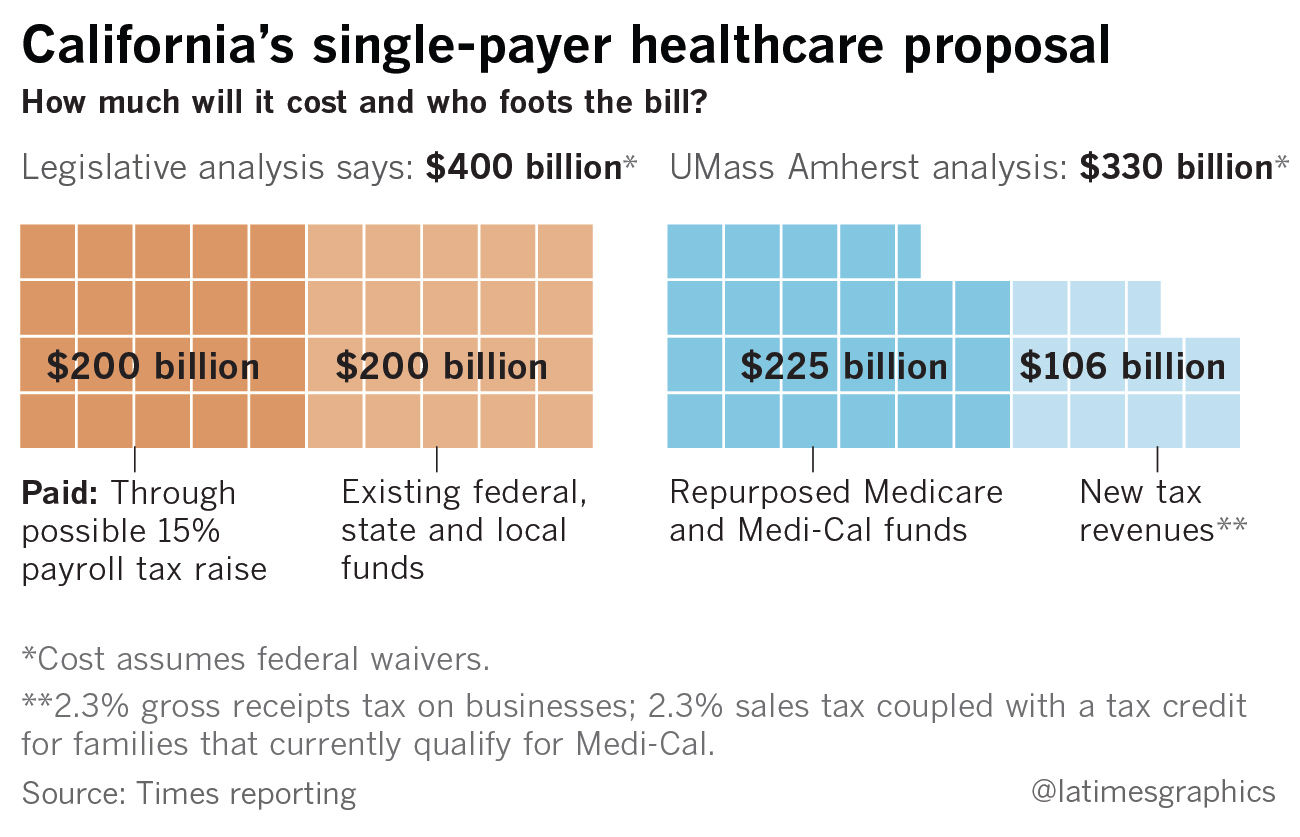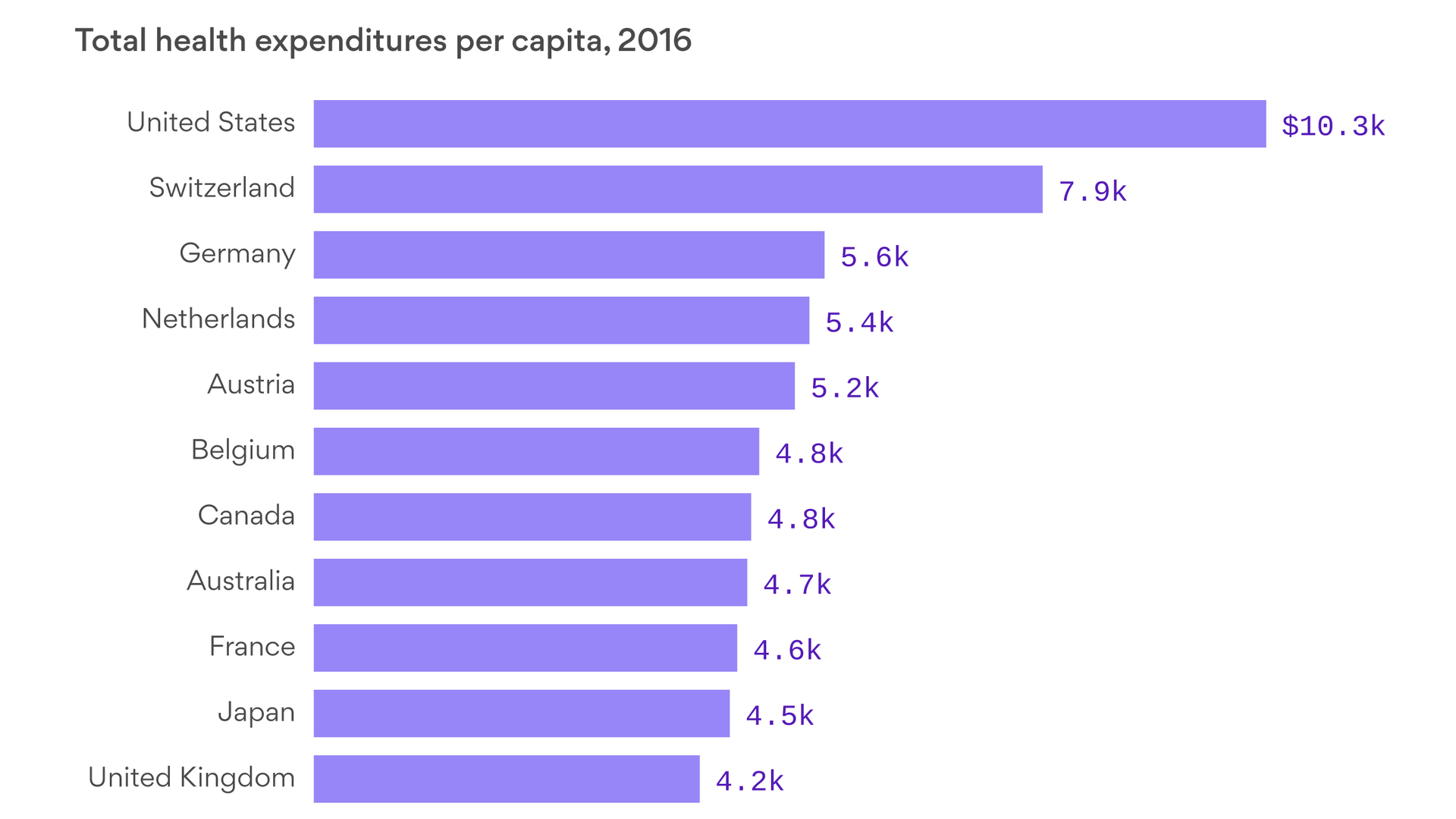Featured
Single Payer Healthcare In The United States
The Surprising Argument Against Single Payer Healthcare in the United States Whether youre for single payer healthcare in the United States or against it youre probably familiar with a whole bunch of arguments that fly around in favor of it or against it ideally you hear them in favor of some other system rather than a flat-out refusal but take what you can get. It would virtually eliminate the entire commercial insurance industrywith 730 billion in revenues and a work force of 470000and replace it with one unified payer.
 What Would California S Proposed Single Payer Healthcare System Mean For Me Los Angeles Times
What Would California S Proposed Single Payer Healthcare System Mean For Me Los Angeles Times
Every US resident would qualify for comprehensive insurance under a public tax-financed plan that would replace private insurers Medicaid and Medicare.

Single payer healthcare in the united states. Health care in the United States is provided by many distinct organizations made up of insurance companies healthcare providers hospital systems and independent providers. In the absence of such a focus any single-payer program instituted in the US. Health care facilities are largely owned and operated by private sector businesses.
Single payer health care is a contentious issue in America. In a 2019 report CBO described some of the key considerations for designing a single-payer system. The single payer would be the US government.
Key elements of single-payer include unified government or quasi-government financing universal coverage with a single comprehensive benefit package elimination of private insurers and universal negotiation of provider reimbursement and drug prices. Single-payer reform would take an audacious step. The United States is the only high-income nation without universal government-funded or -mandated health insurance employing a unified payment system.
Others are concerned that costs would escalate or. Risks inadequately meeting the pressing and unique health care needs of rural communities. Single-payer often referred to as Medicare for All a proposed policy solution since 1990 is receiving.
This guide will present both the single-payer health care pros and cons so you can draw your own conclusion about this complex and divisive topic. These results suggest that designing a national single-payer program in the United States that successfully ameliorates geographic health disparities will require a specific and concerted focus on addressing rural health issues. Tend to share the same key goals.
In recent years proposed changes to the health care industry have grown in both granularity and popularity with the possibility of adapting a single-payer health insurance system reaching an all-time high. However many people do not fully understand what a single-payer health care system would entail. The prospect of single-payer Medicare-for-all reform evokes enthusiasm and concern.
The United States is the only high-income nation without universal government-funded or -mandated health insurance employing a unified payment system. Understanding Single-Payer Health Care. Health care reform continues to be a topic of debate among lawmakers politicians physicians and citizens of the United States.
Medicare for instance covers senior citizens. Such a system is one. Proponents maintain that a single-payer system would be the simplest route to universal coverage.
Colorado through a citizen-initiated constitutional amendment proposal put a state-based single-payer proposal directly on the ballot but it was rejected by 79 of voters. 58 of community hospitals in the United States are non-profit 21 are government-owned and 21 are for-profit. The adoption of a single-payer health care system a recurring dream of progressive American reformers now enjoys sustained attention in the run-up to the 2020 national elections.
Single-payer as it has been proposed in the US has no or minimal cost sharing. Instead America has several separate single-payer systems that cover different classes of citizens. Centralizing the financial and regulatory structure of the system expanding the public benefits package and eliminating private health insurance entirely.
The US multi-payer system leaves residents uninsured or underinsured despite overall healthcare costs far above other nations. Hawaii got close to a. Currently single-payer bills in the US.
Establishing a single-payer health care system in the United States would be a major undertaking which would involve substantially changing the sources and extent of health insurance coverage payment rates for providers and financing methods for health care. The US multi-payer system leaves residents uninsured or underinsured despite overall healthcare costs far above other nations. One is the National Health Service model used in the United Kingdom.
Bizarrely the United States is the only major industrialized nation without a national single-payer healthcare system that covers all citizens. It is a single-payer system because it is tax-funded and most healthcare is provided by the government through public. Single-payer often referred to as Medicare for All a proposed policy solution since 1990 is receiving.
 Looking North Can A Single Payer Health System Work In The U S Kaiser Health News
Looking North Can A Single Payer Health System Work In The U S Kaiser Health News
 Single Payer System A Healthcare Alternative To Affordable Care Act Washington Post
Single Payer System A Healthcare Alternative To Affordable Care Act Washington Post
 How Much Bernie Sanders Medicare For All Would Actually Cost The United States Axios
How Much Bernie Sanders Medicare For All Would Actually Cost The United States Axios
 Could States Do Single Payer Health Care Health Affairs
Could States Do Single Payer Health Care Health Affairs
12 Questions About Single Payer Health Care Vox
 Single Payer Would Drastically Change American Health Care Here S How It Works Chicago Tribune
Single Payer Would Drastically Change American Health Care Here S How It Works Chicago Tribune
/ProConUniversalHealthCare_4156211_final_2-5b9d7ce04bff4f8dab98a4b87deca55e.png) Universal Health Care Definition Countries Pros Cons
Universal Health Care Definition Countries Pros Cons
 Why Clinicians Support Single Payer And Who Will Win And Lose
Why Clinicians Support Single Payer And Who Will Win And Lose
12 Questions About Single Payer Health Care Vox
 Single Payer Healthcare Pluses Minuses And What It Means For You Harvard Health Blog Harvard Health Publishing
Single Payer Healthcare Pluses Minuses And What It Means For You Harvard Health Blog Harvard Health Publishing
 What Is Single Payer Healthcare And Why Is It So Popular Money
What Is Single Payer Healthcare And Why Is It So Popular Money
 Healthcare In Germany Wikipedia
Healthcare In Germany Wikipedia
12 Questions About Single Payer Health Care Vox
 Key Design Components And Considerations For Establishing A Single Payer Health Care System Congressional Budget Office
Key Design Components And Considerations For Establishing A Single Payer Health Care System Congressional Budget Office
Popular Posts
How To Tell The Difference Between Lice And Dandruff
- Get link
- X
- Other Apps
Comments
Post a Comment